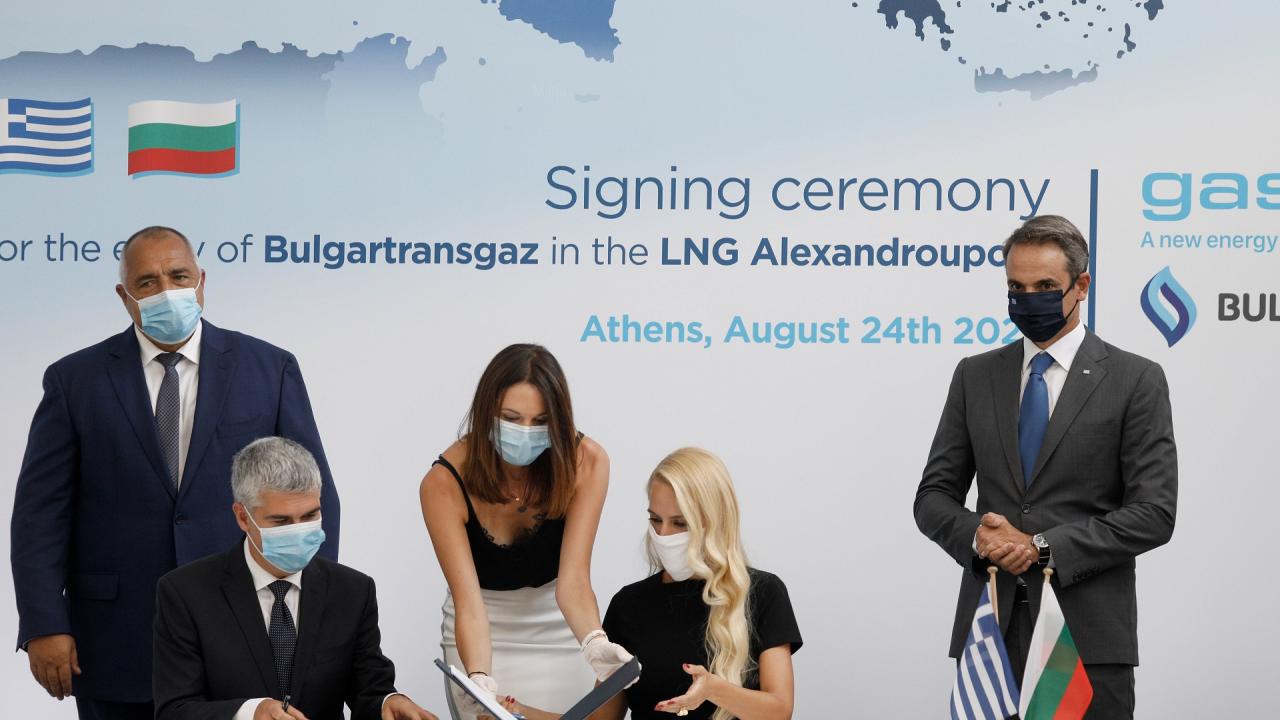Greece and Bulgaria advanced the development of three natural gas projects this week that will lessen the two countries’ dependence on Russian gas. Greece’s parliament ratified on January 26 a cooperation agreement on the Interconnector Greece-Bulgaria (IGB) pipeline and the foundation treaty of the EastMed Gas Forum (EMGF) while two days later Bulgaria’s state gas company Bulgartransgaz finalised a deal to take 20% of Greek company Gastrade, which is developing the Alexandroupolis foating LNG
by Kostis Geropoulos
Greece and Bulgaria advanced the development of three natural gas projects this week that will lessen the two countries’ dependence on Russian gas. Greece’s parliament ratified on January 26 a cooperation agreement on the Interconnector Greece-Bulgaria (IGB) pipeline and the foundation treaty of the EastMed Gas Forum (EMGF) while two days later Bulgaria’s state gas company Bulgartransgaz finalised a deal to take 20% of Greek company Gastrade, which is developing the Alexandroupolis foating LNG receiving, storage and regasification unit (FSRU). Greece’s Public Gas Corporation DEPA and GasLog also hold 20% stakes in the LNG facility which is expected to begin operating in 2023.
"Bulgaria's commitment to buy 20% into the Alexandroupolis LNG terminal is excellent news, Charles Ellinas, senior fellow, Global Energy Center, Atlantic Council, told New Europe on January 28. The LNG terminal, which will have an estimated annual capacity of about 5.5 billion cubic metres, will aim to supply gas to southeastern Europe via IGB. "Not only it strengthens that project, but it also dovetails well into the IGB interconnector project, of which Bulgaria is co-owner. The synergy and combination of the two projects enhances Greece's strategic role in the region, but it also ensures diversity and security of gas supplies for both countries, by opening up another supply route other than Russian pipeline gas,” Ellinas added. The IGB pipeline is expected, under the current circumstances, to be completed by the end of 2021, Greece’s Environment and Energy Ministry said in an emailed note on January 26.
The pipeline is expected to reduce Greece and Bulgaria’s reliance on Russian gas as at its starting point, in Greece, the pipeline will be connected to the Trans-Adriatic Pipeline (TAP) and the system of Greek natural gas transmission operator DESFA while at its end it will be connected to the system of Bulgarian gas operator Bulgartransgaz. "By providing gas supply from an additional input source, the IGB will enhance the security of supply in Southeast Europe,” Greece’s Energy Ministry said. With the signing of a Memorandum of Understanding between Greece and Bulgaria in 2009, the foundations were laid for the con struction of the interconnection pipeline between the two countries, the Greek ministry said, adding that the work of the IGB has been characterized as a project of "National Importance” by Greece, as well as by the Council of Ministers of Bulgaria.
On October 10, 2019, in a special ceremony in Sofia, the Intergovernmental Agreement for the promotion of the pipeline was signed between the two countries. The agreement was ratified by the Bulgarian Parliament on July 2, 2020, and has already been forwarded to the Greek Parliament for ratification. The IGB pipeline will connect Komotini in Greece with Stara Zagora in Bulgaria. The length of the pipeline is estimated at 182 kilometers, of which 151 kilometers are in Bulgaria and the remaining 31 kilometers in Greece. The diameter of the pipe reaches 32 inches (813 mm). The capacity of the pipeline reaches 3 billion cubic meters per year at an estimated cost of €220 million, with the possibility of reverse flow. The capacity can be increased to 5 billion cubic meters per year with the additional installation of a compression Station. The project also includes the necessary support facilities. The design, construction and operation work has been undertaken by the ICGB consortium. The shareholders of the company are by 50% the Greek company Poseidon, in which DEPA and Italy’s Edison participate equally, and by the remaining 50% the Bulgarian state company Bulgarian Energy Holding (BEH).
The European Energy Program for Recovery/EEPR is funding 20% of the project as the IGB has been included in the list of EU Projects of Common Interest. By December 2020, 52% of the project had been completed, while 37% of the pipeline had been constructed. Greece’s Energy Ministry on January 26 reiterated the geopolitical significance of the construction and operation of the IGB project, noting that the project boost’s the country’s geostrategic position as a gateway for natural gas to the European market from diversified sources and mainly from TAP. In addition, however, it utilizes the planned Alexandroupolis FSRU as the quantities that will be imported through it are foreseen to be transported to the North via IGB. The IGB is the first part of the so-called Vertical Corridor, interconnecting the national gas systems of Greece, Bulgaria, Romania and Hungary with the aim of alternatively supplying the countries of Southeastern and Central Europe.
Turning to the ratification of the foundation treaty of the EastMed Gas Forum by the Greek Parliament, Greece’s Environment and Energy Ministry reminded that the main purpose of the EMGF Regional Agency is to act as a bridge that will bring gas producers, consumers and transit countries together, with the ultimate goal of developing a sustainable regional gas market in the Eastern Mediterranean. During the first meeting of the Energy Ministers of Jordan, Cyprus, Greece, Egypt, Palestine, Israel and Italy, which took place in Cairo on January 14, 2019, the Ministers announced their intention to establish a Forum. The foundation treaty of the EMGF was signed in September 2020 by its seven members - Egypt, Greece, Cyprus, Israel, Italy, Jordan, Palestine - and has already been ratified by four of them.




